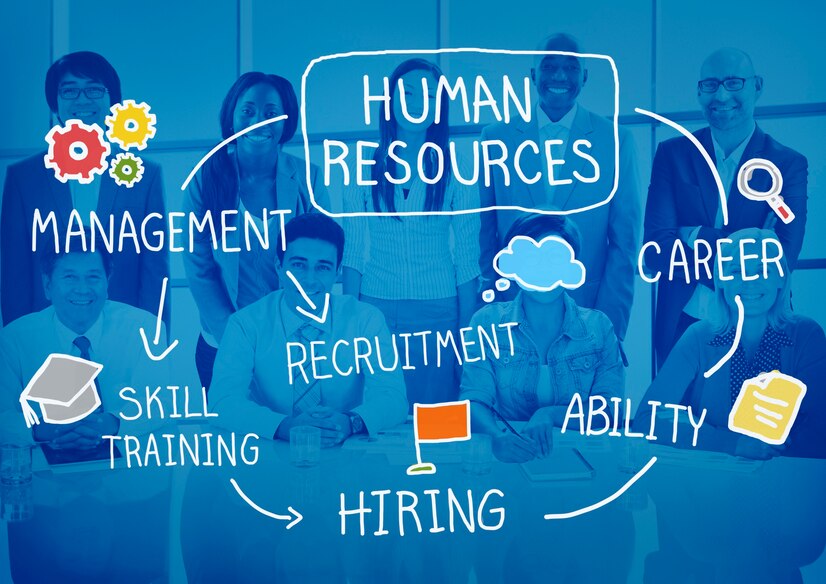Human Resources (HR) plays a pivotal role in the success of any organization. Beyond managing employee relations and benefits, HR is integral to shaping company culture, driving performance, and aligning workforce capabilities with business goals. This article explores the various functions of HR and how they contribute to organizational success.
Key Functions of Human Resources

- Recruitment and Talent Acquisition: One of the primary responsibilities of HR is to attract, recruit, and hire the right talent. By developing effective recruitment strategies and employer branding, HR ensures that organizations have access to a pool of qualified candidates who can drive business objectives.
- Training and Development: HR is responsible for identifying training needs and implementing development programs that enhance employee skills. Continuous learning opportunities not only improve individual performance but also contribute to overall organizational growth.
- Performance Management: HR establishes performance management systems that set clear expectations for employees. Regular feedback, evaluations, and performance reviews help employees understand their contributions and areas for improvement, fostering a culture of accountability.
- Employee Relations: Maintaining positive employee relations is crucial for organizational success. HR mediates conflicts, addresses grievances, and promotes a healthy work environment where employees feel valued and engaged.
- Compensation and Benefits: HR designs competitive compensation packages that attract and retain talent. By managing employee benefits, such as health insurance, retirement plans, and paid time off, HR enhances job satisfaction and loyalty.
- Compliance and Risk Management: HR ensures that the organization adheres to labor laws and regulations, minimizing legal risks associated with employment practices. This compliance protects both the organization and its employees.
- Organizational Culture Development: HR plays a critical role in shaping the organizational culture by promoting values that align with business goals. A strong culture enhances employee engagement, productivity, and retention.
- Strategic Planning: As a strategic partner, HR aligns human resource policies with the organization’s long-term objectives. By forecasting workforce needs and identifying skill gaps, HR contributes to effective succession planning and talent management.
The Impact of Human Resources on Organizational Success
The effectiveness of an organization is often directly related to its human capital. Here are several ways in which HR contributes to organizational success:
- Increased Employee Engagement: Engaged employees are more productive, motivated, and committed to their work. HR initiatives that promote engagement lead to higher levels of job satisfaction and lower turnover rates.
- Enhanced Productivity: Through effective training programs and performance management systems, HR helps employees reach their full potential, resulting in improved productivity across the organization.
- Stronger Employer Brand: A well-managed HR function enhances the employer brand by creating a positive workplace culture that attracts top talent. This reputation can be a significant competitive advantage in the marketplace.
- Adaptability to Change: In today’s fast-paced business environment, organizations must be agile. HR facilitates change management processes that prepare employees for transitions while minimizing resistance.
Conclusion
The role of Human Resources in organizational success cannot be overstated. By focusing on recruitment, training, employee relations, compliance, culture development, and strategic alignment, HR serves as a vital partner in achieving business objectives. Organizations that invest in their human capital through effective HR practices are better positioned for long-term success.
FAQs
- What are the primary functions of Human Resources?
- The primary functions include recruitment, training and development, performance management, employee relations, compensation management, compliance, culture development, and strategic planning.
- How does HR contribute to employee engagement?
- HR fosters engagement through initiatives that promote job satisfaction, provide training opportunities, manage performance effectively, and create a positive work environment.
- Why is compliance important in Human Resources?
- Compliance ensures that the organization adheres to labor laws and regulations, reducing legal risks associated with employment practices.
- How can HR enhance organizational culture?
- HR can enhance culture by promoting values aligned with business goals, encouraging open communication, and recognizing employee contributions.
- What is the role of HR in strategic planning?
- HR aligns human resource policies with organizational objectives by forecasting workforce needs and identifying skill gaps for future growth.
